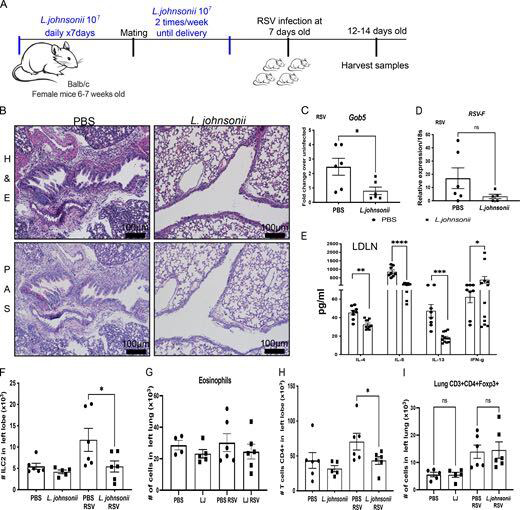Study Finds that Microbiome Colonization During Infancy is Critical for Modulating Immunity Later in Life
By Camren Clouthier | October 29 2021A  study related to the maternal gut microbiome and how it regulates immunity to respiratory syncytial virus (RSV) infections in offspring was recently published in the Journal of Experimental Medicine. Clinical experts from the Department of Pathology including Drs. Wendy Fonseca, Nicholas Lukacs, and Catherine Ptaschinski were responsible for carrying out this study.
study related to the maternal gut microbiome and how it regulates immunity to respiratory syncytial virus (RSV) infections in offspring was recently published in the Journal of Experimental Medicine. Clinical experts from the Department of Pathology including Drs. Wendy Fonseca, Nicholas Lukacs, and Catherine Ptaschinski were responsible for carrying out this study.
"It is becoming clear that the microbiome that colonizes the infant gut during early life is critical for modulating immune responses later in childhood," suggests Dr. Ptaschinski. "Early studies that looked at children raised on farms or with pets have shown that these children are significantly less likely to develop allergies or asthma compared to children in urban areas. In fact, the microbiome at one-month-old is a strong predictor of allergy development later in life."
Previous studies have found that dust collected from houses with dogs was able to protect mice from the development of allergic disease, in part due to a more diverse microbiome, including enrichment with the probiotic Lactobacillus Johnsonii. However, these studies were performed in adult mice.
"Because the protective effect in humans is seen so early in life before infants are eating solid food, we asked whether the maternal microbiome has any impact on early-life microbial colonization and immune development," explains Ptaschinski.
In this study, using a murine model, researchers ultimately found that altering the maternal microbiome by supplementing female mice with L. Johnsonii resulted in changes in neonatal immune development.
Results showed that the development is impacted by maternal supplementation in two ways. First, some aspects of the offspring's immune development are altered by metabolites that are made by maternal gut microbes, to which offspring are exposed both in utero and during delivery. Other neonatal immune responses are altered by metabolites that are passed through the milk that the offspring consume prior to weaning. We also found that neonates born to females supplemented with L. Johnsonii have a more diverse microbiome early in life.
"Thus, we were able to show that a diverse maternal microbiome impacts the development of the neonatal microbiome and immune response in early life," concludes Ptaschinski.
—
The full publication in the Journal of Experimental Medicine is available here.
 ON THE COVER
ON THE COVER
 ON THE COVER
ON THE COVER
 ON THE COVER
ON THE COVER
 ON THE COVER
ON THE COVER
 ON THE COVER
ON THE COVER
 ON THE COVER
ON THE COVER
 ON THE COVER
ON THE COVER
 ON THE COVER
ON THE COVER
 ON THE COVER
ON THE COVER
 ON THE COVER
ON THE COVER
 ON THE COVER
ON THE COVER
